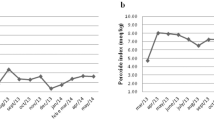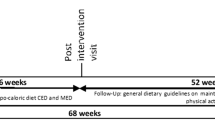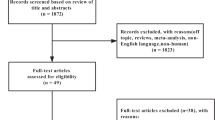Abstract
Objective: To determine whether the cholesterol-lowering effect of a plant-based low-fat diet can be improved by a flexible control design that controls the extent of fat reduction based on the individual response of blood cholesterol.
Design: Randomized, double-blind intervention study.
Setting: A hotel in Prerow, Germany.
Subjects: A total of 32 participants (21 female and 11 male participants) with total cholesterol level>5.7 mmol/l.
Intervention: The control group consumed a plant-based low-fat diet with constantly 20% of energy as fat; the intervention group received a diet with either 20 or 15% of energy as fat, depending on the serum cholesterol response of the preceding week. A flexible control design based on the individual cholesterol response during a run-in period of 1 week was used within a low-fat intervention.
Results: During the run-in period, the consumption of a plant-based low-fat diet led to a reduction in total cholesterol by 18±6 mmol/l (P<0.001), in LDL cholesterol by 19±9 mmol/l (P<0.001) and triglycerides by 13±3 mmol/l (P<0.001). During the feedback control period, an additional reduction in total cholesterol by 13±8 (P<0.001) and in LDL cholesterol by 17±11 (P<0.001) was observed compared to 15±15 and 7±18 in the control group. The effect of an additional feedback control was only marginal and not statistically significant compared to the effect of the low-fat diet alone.
Conclusions: On a level of fat intake already reduced to 20% of energy, the use of a feedback control to adapt the fat content of the diet depending on the individual serum cholesterol response was not more effective in reducing blood cholesterol levels than a plant-based low-fat diet alone.
Sponsorship: Institute of Micro-Ecology, Herborn; the Stoll VITA Foundation, Waldshut; ALBAT+WIRSAM Software, Linden; Reformhaus Technical College, Oberstedten; Kölln Flocken Werke, Elmshorn, all in Germany.
This is a preview of subscription content, access via your institution
Access options
Subscribe to this journal
Receive 12 print issues and online access
$259.00 per year
only $21.58 per issue
Buy this article
- Purchase on Springer Link
- Instant access to full article PDF
Prices may be subject to local taxes which are calculated during checkout


Similar content being viewed by others
References
Ansell B (2002): Future directions in lipid therapies. Adv. Ther. 19, 61–72.
Cheung ST (2000): Possible dangers in a low fat diet: some evidence reviewed. Nutr. Health 14, 271–280.
D. A. CH (2000): DGfE, Österreichische Gesellschaft für Ernährung SGfE, Schweizerische Vereinigung für Ernährung). Reference values for nutrient intake [German: Referenzwerte für die Nährstoffzufuhr], Frankfurt am Main: Umschau.
Dallongeville J, Lussier-Cacan S & Davignon J (1992): Modulation of plasma triglyceride levels by apoE phenotype: a meta-analysis. J. Lipid Res. 33, 447–454.
Day D (2001): Population-based screening with the Coronary Heart Disease Risk Factor Calculator. Adv. Ther. 18, 21–32.
Donohoe GG, Salomaki A, Lehtimaki T, Pulkki K & Kairisto V (1999): Rapid identification of apolipoprotein E genotypes by multiplex amplification refractory mutation system PCR and capillary gel electrophoresis. Clin. Chem. 45, 143–146.
Dreon DM, Fernstrom HA, Miller B & Krauss RM (1995): Apolipoprotein E isoform phenotype and LDL subclass response to a reduced-fat diet. Arterioscler. Thromb. Vasc. Biol. 15, 105–111.
Dumesnil JG, Turgeon J, Tremblay A, Poirier P, Gilbert M, Gagnon L, St-Pierre S, Garneau C, Lemieux I, Pascot A, Bergeron J & Despres JP (2001): Effect of a low-glycaemic index–low-fat–high protein diet on the atherogenic metabolic risk profile of abdominally obese men. Br. J. Nutr. 86, 557–568.
Dunn-Emke S, Weidner G & Ornish D (2001): Benefits of a low-fat plant-based diet. Obes. Res. 9, 731.
Erkkila AT, Sarkkinen ES, Lindi V, Lehto S, Laakso M & Uusitupa MI (2001): APOE polymorphism and the hypertriglyceridemic effect of dietary sucrose. Am. J. Clin. Nutr. 73, 746–752.
Federal Institute for Health Protection of Consumers and Veterinary Medicine (1999): The German Food Code and Nutrient Data Base (BLS II.3): conception, structure and documentation of the data base blsdat. Berlin, Germany: BgVV Publications.
Gibney MJ (1999): Optimal macronutrient balance. Proc. Nutr. Soc. 58, 421–425.
Gimeno E, Fito M, Lamuela-Raventos RM, Castellote AI, Covas M, Farre M, de La Torre-Boronat MC & Lopez-Sabater MC (2002): Effect of ingestion of virgin olive oil on human low-density lipoprotein composition. Eur. J. Clin. Nutr. 56, 114–120.
Grande F, Anderson JT, Chlouverakis C, Proja M & Keys A (1965): Effect of dietary cholesterol on man's serum lipids. J. Nutr. 87, 52–62.
Hegsted DM, McGandy RB, Myers ML & Stare FJ (1965): Quantitative effects of dietary fat on serum cholesterol in man. Am. J. Clin. Nutr. 17, 281–295.
Hermansen K, Dinesen B, Hoie LH, Morgenstern E & Gruenwald J (2003): Effects of soy and other natural products on LDL:HDL ratio and other lipid parameters: a literature review. Adv. Ther. 20, 50–78.
Hoffmann I, Groeneveld MJ, Boeing H, Koebnick C, Golf S, Katz N & Leitzmann C (2001): Giessen Wholesome Nutrition Study: relation between a health-conscious diet and blood lipids. Eur. J. Clin. Nutr. 55, 887–895.
Johnson RK & Kennedy E (2000): The 2000 Dietary Guidelines for Americans: what are the changes and why were they made? The Dietary Guidelines Advisory Committee. J. Am. Diet. Assoc. 100, 769–774.
Koebnick C, Heins UA, Hoffmann I, Dagnelie PC & Leitzmann C (2001): Folate status during pregnancy in women is improved by long-term high vegetable intake compared with the average western diet. J. Nutr. 131, 733–739.
Lefevre M, Ginsberg HN, Kris-Etherton PM, Elmer PJ, Stewart PW, Ershow A, Pearson TA, Roheim PS, Ramakrishnan R, Derr J, Gordon DJ & Reed R (1997): ApoE genotype does not predict lipid response to changes in dietary saturated fatty acids in a heterogeneous normolipidemic population. The DELTA Research Group. Dietary effects on lipoproteins and thrombogenic activity. Arterioscler. Thromb. Vasc. Biol. 17, 2914–2923.
Lopez-Miranda J, Ordovas JM, Mata P, Lichtenstein AH, Clevidence B, Judd JT & Schaefer EJ (1994): Effect of apolipoprotein E phenotype on diet-induced lowering of plasma low density lipoprotein cholesterol. J. Lipid. Res. 35, 1965–1975.
Mensink RP & Katan MB (1992): Effect of dietary fatty acids on serum lipids and lipoproteins. A meta-analysis of 27 trials. Arterioscler. Thromb. 12, 911–919.
Ordovas JM (1999): The genetics of serum lipid responsiveness to dietary interventions. Proc. Nutr. Soc. 58, 171–187.
Ordovas JM & Galluzzi JR (1999): Genetic predictors of plasma lipid response to diet intervention. Curr. Atheroscler. Rep. 1, 196–203.
Ornish D (1998): Serum lipids after a low-fat diet. JAMA 279, 1345–1346.
Ornish D, Brown SE, Scherwitz LW, Billings JH, Armstrong WT, Ports TA, McLanahan SM, Kirkeeide RL, Brand RJ & Gould KL (1990): Can lifestyle changes reverse coronary heart disease? The Lifestyle Heart Trial. Lancet 336, 129–133.
Pasternak R (2002): Adult Treatment Panel II versus Adult Treatment Panel III: what has changed and why? Am. J. Cardiol. 89, 3C–7C.
Poppitt SD, Keogh GF, Mulvey TB, McArdle BH, MacGibbon AK & Cooper GJ (2002): Lipid-lowering effects of a modified butter-fat: a controlled intervention trial in healthy men. Eur. J. Clin. Nutr. 56, 64–71.
Sabate J (2003): The contribution of vegetarian diets to health and disease: a paradigm shift? Am. J. Clin. Nutr. 78, 502S–507S.
Sabate J, Haddad E, Tanzman JS, Jambazian P & Rajaram S (2003): Serum lipid response to the graduated enrichment of a Step I diet with almonds: a randomized feeding trial. Am. J. Clin. Nutr. 77, 1379–1384.
Sarkkinen E, Korhonen M, Erkkila A, Ebeling T & Uusitupa M (1998): Effect of apolipoprotein E polymorphism on serum lipid response to the separate modification of dietary fat and dietary cholesterol. Am. J. Clin. Nutr. 68, 1215–1222.
Savolainen MJ, Rantala M, Kervinen K, Jarvi L, Suvanto K, Rantala T & Kesaniemi YA (1991): Magnitude of dietary effects on plasma cholesterol concentration: role of sex and apolipoprotein E phenotype. Atherosclerosis 86, 145–152.
Schaefer EJ (2002): Lipoproteins, nutrition, and heart disease. Am. J. Clin. Nutr. 75, 191–212.
Schaefer EJ, Lamon-Fava S, Ausman LM, Ordovas JM, Clevidence BA, Judd JT, Goldin BR, Woods M, Gorbach S & Lichtenstein AH (1997): Individual variability in lipoprotein cholesterol response to National Cholesterol Education Program Step 2 diets. Am. J. Clin. Nutr. 65, 823–830.
US Department of Agriculture & US Department of Health and Human Services (2000): Nutrition and your Health: Dietary Guidelines for the Americans. Washington, DC (Home and Garden Bulletin No 232): US Government Printing Office.
Weggemans RM, Zock PL, Urgert R & Katan MB (1999): Differences between men and women in the response of serum cholesterol to dietary changes. Eur. J. Clin. Invest. 29, 827–834.
Wirsam B, Hahn A, Uthus EO & Leitzmann C (1997): Fuzzy sets and fuzzy decision making in nutrition. Eur. J. Clin. Nutr. 51, 286–296.
Wirsam B & Uthus EO (1996): The use of fuzzy logic in nutrition. J. Nutr. 126, 2337S–2341S.
Zunft HJ, Luder W, Harde A, Haber B, Graubaum HJ & Gruenwald J (2001): Carob pulp preparation for treatment of hypercholesterolemia. Adv. Ther. 18, 230–236.
Acknowledgements
This project was supported by the Institute of Micro-Ecology, Herborn; the Stoll VITA Foundation, Waldshut; ALBAT+WIRSAM Software, Linden; Reformhaus Technical College, Oberstedten; Kölln Flocken Werke, Elmshorn, all in Germany. We are grateful to the staff of the hotel ‘Haus Linden’ for all their efforts. We also thank the study participants for their excellent compliance.
Author information
Authors and Affiliations
Contributions
Guarantor: C Koebnick.
Contributors: SPH, BW, AH, CL, HJFZ and CK contributed to the design of the study. SPH, BW, CL and HJFZ were available for the participants during the study period in the study center. CK and SPH were responsible for the statistical analysis and interpretation of the data. CMK contributed to the laboratory analysis. All authors contributed to the conduct of the study, data collection and writing of the manuscript.
Corresponding author
Rights and permissions
About this article
Cite this article
Koebnick, C., Plank-Habibi, S., Wirsam, B. et al. Double-blind, randomized feedback control fails to improve the hypocholesterolemic effect of a plant-based low-fat diet in patients with moderately elevated total cholesterol levels. Eur J Clin Nutr 58, 1402–1409 (2004). https://doi.org/10.1038/sj.ejcn.1601984
Received:
Revised:
Accepted:
Published:
Issue Date:
DOI: https://doi.org/10.1038/sj.ejcn.1601984
Keywords
This article is cited by
-
What makes a plant-based diet? a review of current concepts and proposal for a standardized plant-based dietary intervention checklist
European Journal of Clinical Nutrition (2022)
-
Effectiveness of diet versus exercise intervention on weight reduction in local Japanese residents
Environmental Health and Preventive Medicine (2012)
-
Vegetarische Ernährung: Präventives Potenzial und mögliche Risiken
Wiener klinische Wochenschrift (2006)



